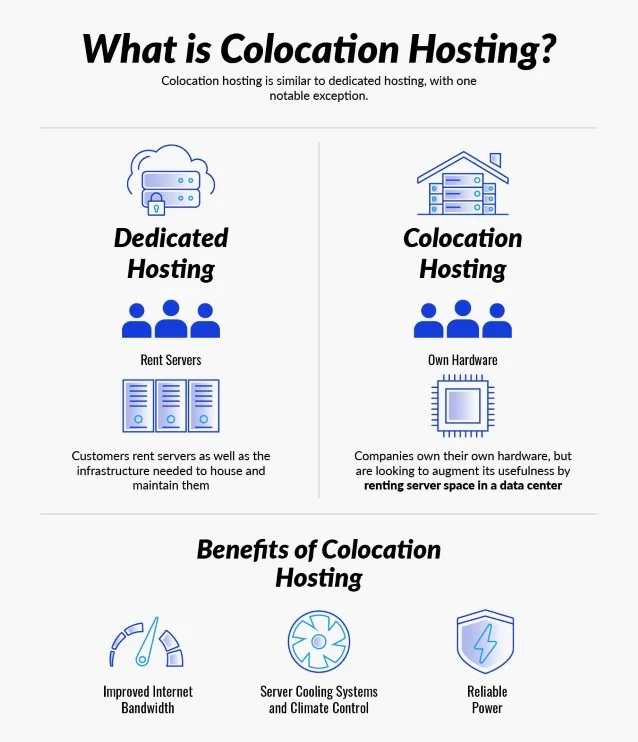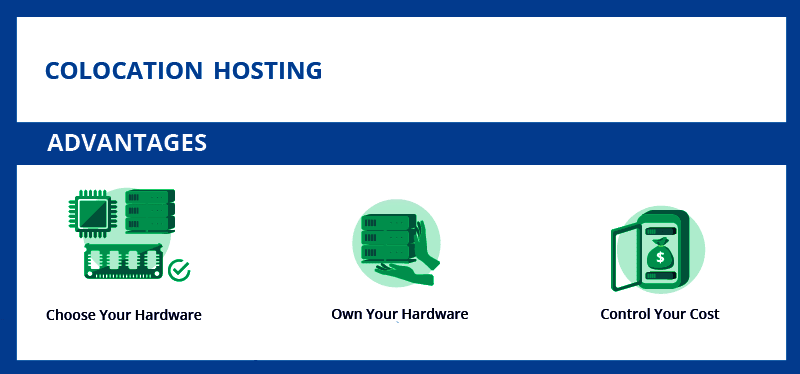Managed Hosting vs. Colocation: Which Is Right for Your Business?
Managed Hosting vs. Colocation – In the ever-evolving world of web hosting, businesses are presented with several options for infrastructure management. Two popular solutions for companies seeking more control over their server environments are managed hosting and colocation. Both offer robust features, but they cater to different business needs, priorities, and technical expertise. This blog will explore the key differences between managed hosting and colocation to help you decide which is the best fit for your business.
What is Managed Hosting?
Managed hosting refers to a hosting solution where the provider offers full management of your dedicated servers or virtual machines. This includes handling everything from hardware and software management to monitoring, updates, security, and performance optimization. In essence, the hosting provider takes care of the infrastructure, leaving your team to focus on your core business operations.
Key Features of Managed Hosting:
- Fully Managed Infrastructure: The hosting provider handles server setup, management, and monitoring. This means your team doesn’t need to worry about hardware failures, system updates, or routine maintenance.
- Security: Managed hosting providers typically implement advanced security measures, including firewalls, DDoS protection, and regular security patches.
- Support: Around-the-clock technical support is available to assist with any issues related to the server, often through multiple channels like phone, email, or chat.
- Software Management: The provider is responsible for software installation, updates, and patches.
- Backup and Disaster Recovery: Many managed hosting plans come with automated backups and disaster recovery services to ensure data safety.
- Scalability: Managed hosting services often include the ability to easily scale resources (CPU, RAM, bandwidth) up or down as needed, depending on your business growth.
What is Colocation?

Colocation, on the other hand, is a hosting solution where you rent physical space in a third-party data center to house your own hardware (servers, network equipment, etc.). With colocation, the data center provides the physical environment (such as power, cooling, bandwidth, and security), but you’re responsible for maintaining and managing the servers.
Key Features of Colocation:
- Ownership of Hardware: You own and control your hardware, giving you full control over the configuration and maintenance of your infrastructure.
- Dedicated Physical Space: Your servers are housed in a data center with high availability, redundant power supplies, and top-tier cooling systems.
- Customization: Since you control your own servers, you have the flexibility to configure your hardware exactly how you need it.
- Security: Colocation data centers offer advanced physical security measures, such as biometric scanners, surveillance cameras, and 24/7 staff monitoring. However, security management for your hardware and software is your responsibility.
- Cost Savings on Infrastructure: While you still have to purchase and maintain your servers, colocation can be more cost-effective than running your own data center because you don’t need to invest in the physical infrastructure (power, cooling, security, etc.).
- Network Connectivity: Colocation facilities often offer high-speed, reliable internet connectivity, along with redundancy for high availability.
Managed Hosting vs. Colocation – Key differences
| Feature | Managed Hosting | Colocation |
|---|---|---|
| Infrastructure Ownership | Provider owns the infrastructure. | You own the infrastructure (servers, network gear). |
| Management | Fully managed by the provider (hardware, software, etc.). | You manage the servers and software. |
| Support | 24/7 support for hardware and software issues. | You manage your own hardware, relying on data center support for physical issues. |
| Scalability | Easy scalability through the provider. | Limited to the physical space and hardware you own. |
| Customization | Limited, based on available server configurations. | High degree of customization based on your own hardware. |
| Security | Built-in security features provided by the hosting provider. | You manage software security, while physical security is handled by the data center. |
| Cost | Typically more expensive, as management services are included. | Upfront hardware costs, but potentially cheaper over time. |
| Maintenance | Provider handles maintenance, updates, and troubleshooting. | You are responsible for hardware maintenance and repairs. |
When to Choose Managed Hosting
Managed hosting is ideal for businesses that want a hassle-free hosting solution and don’t have the technical expertise or resources to manage their own servers. It’s a great choice for:
- SMBs (Small and Medium Businesses) that lack dedicated IT teams.
- Growing businesses that need to focus on development, sales, and marketing without worrying about server management.
- Companies that require 24/7 technical support and a reliable, hands-off experience.
- Organizations that value security and want to leave updates, patches, and monitoring to the experts.
Managed hosting is also the preferred option for businesses that don’t want the capital expense of purchasing and maintaining physical hardware, as well as the operational overhead of managing a server farm.
When to Choose Colocation

Colocation is best suited for businesses that have the technical expertise and resources to manage their own infrastructure. It’s a good option for:
- Large enterprises or businesses with complex IT requirements, needing complete control over their hardware.
- Companies with specific compliance requirements that mandate certain physical or security configurations.
- Organizations that already own their hardware and want to take advantage of enterprise-level data center facilities without the need to maintain their own infrastructure.
- Businesses that want to scale up their infrastructure by adding more hardware and need the flexibility to make custom configurations.
Colocation is particularly attractive to companies that need high availability and performance but also want to avoid the costs associated with running their own data center.
Conclusion: Which One Is Right for You?
Ultimately, the decision between managed hosting and colocation depends on your business needs, budget, and technical expertise. If you prefer a hassle-free, all-in-one solution with full support and management, managed hosting might be the right choice. It’s an excellent option for businesses looking to offload server management and focus on growth.
On the other hand, if you want complete control over your hardware and software, have the expertise to manage your own infrastructure, and are comfortable handling server maintenance, colocation could be the more cost-effective and customizable option in the long run.
Each approach has its own advantages, and choosing the right one for your business can help you improve efficiency, reduce operational costs, and ensure that your web presence runs smoothly.
By understanding the key features and differences of managed hosting and colocation, you can make a more informed decision about which hosting solution best aligns with your business goals. Whether you value convenience, control, or cost-effectiveness, there’s an option out there for you.